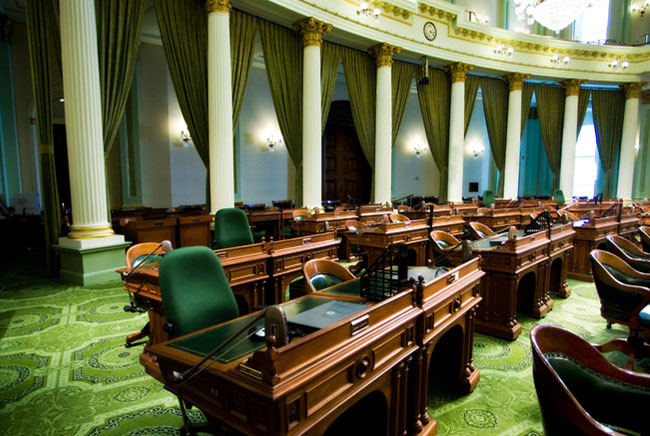From your small-business-advocacy team in Sacramento
Welcome to the August 7-11 edition of the Main Street Minute from your small-business-advocacy team in Sacramento.
Halls of Power Quiet This Week
- Congress is on summer break (Oops! “District Work Period,” as the House calls it) until after Labor Day, and the California State Legislature is in the last week of its summer recess, returning Monday, August 14.
- When state lawmakers come back, it will be full speed ahead, because they have just one scheduled month to complete all business before adjourning for the rest of 2023. “Scheduled,” because there’s always the potential for a special session, although that is not looking likely.
- For small business owners, the Legislature’s scheduled September 14 adjournment cannot come soon enough, and with it, we can only hope, the demise of such bills as granting every Californian a constitutional right to join a union, expanding paid sick leave days and allowing those days to accrue and carry over from year to year, and allowing every Tom, Dick, and Mary, if not a relative, to claim familial closeness in order to take paid time off, too. On and on it goes.
- From the 2,995 bills introduced this year, NFIB narrowed to 52 the best and worst, which you can click here to read. From that list, NFIB refined it even more to 10 particularly Good, Bad, and Ugly ones. Of course, if you’re in a real hurry and just want to know the progress of pro-small-business proposals remaining, well, we’ll see you next year. The two that remain are of negligible benefit.
- Reminder: You can find this Main Street Minute and all past ones on the NFIB California webpage, www.nfib.com/ca or www.nfib.com/california.
December UI Surprise?
- “California has no shortage of debt now. The state treasurer’s office says that as of July 1, the state was on the hook for $121 billion in principal and interest on bonds it already has issued. That doesn’t count the $18 billion owed to the feds for unemployment insurance, the $82 billion in unfunded liabilities for state employee health care or at least that much in unfunded liabilities for state worker pension obligations,” reports CalMatters.
- “One of those strategies [for dealing with the debt] emulates the federal government’s chronic addiction to borrowing money to cover operating deficits. The 2023-24 budget includes several examples, including directly tapping the state’s special funds for loans and indirectly borrowing from employers by forcing them to repay the state’s $18 billion debt to the federal government for unemployment insurance benefits during the COVID-19 pandemic.”
- According to the state’s Employment Development Department (EDD), “UI is paid by the employer. Tax-rated employers pay a percentage on the first $7,000 in wages paid to each employee in a calendar year. The UI rate schedule and amount of taxable wages are determined annually. New employers pay 3.4 percent (.034) for a period of two to three years. We notify employers of their new rate each December. The maximum tax is $434 per employee per year (calculated at the highest UI tax rate of 6.2 percent x $7,000.).”
- So, what awaits small business owners come this December? As reported in the June 19-23 Main Street Minute:
— According to a report by the state Legislative Analyst’s Office (LAO), “To repay the federal loans, the federal UI payroll tax rate on employers will increase by 0.3 percent for tax year 2022. However, employers will not pay this higher rate until 2023 when employers remit their 2022 federal UI payroll taxes.”
— The chart provided in the report pegs the 2023 UI payroll tax at $316 per employee per year: $253 for the state UI payroll tax; $42 for the base federal UI payroll tax; and $21 for a federal UI payroll tax add-on. By 2031, LAO estimates both the state and base UI payroll taxes to remain the same, but the federal UI add-on to rise to $189 for a total of $484 per employee per year – if nothing until then is done about reducing California’s federal UI loans.
- When the pandemic surprised the nation, it was understandable California was one of 22 states and the Virgin Islands that needed to borrow from the federal government to keep its unemployment insurance trust fund solvent and benefits going to those in need. What is not understandable is why it remains one of only two states (New York, the other) that has not paid its UI loans back, unless, of course, it just doesn’t care about small business.
NFIB in the News
- The Northern California Record interviewed Beth Milito, executive director of the NFIB Small Business Legal Center, about the State Supreme Court’s recent PAGA decision.
- “The yearlong wait on the future of California’s Private Attorneys General Act (PAGA) has yielded a conflicting opinion from the state Supreme Court, which recently ruled that collective PAGA claims can proceed in court even when an individual employee’s case is already in arbitration, deepening the perception among employers and the business community that California remains a less than welcoming place to do business, critics say.
- “’The decision really exposes California employers, and unfortunately, small business owners to greater uncertainty now and greater liability in the state,’ Milito said. ‘Even though the court mentioned PAGA abuse, it did not address it head on, and we think that is something they should have factored in more.’”
National
With Congress in recess, NFIB Legislative Program Manager Caitlin Lanzara’s report is taking the week off.
Next Main Street Minute August 14.

